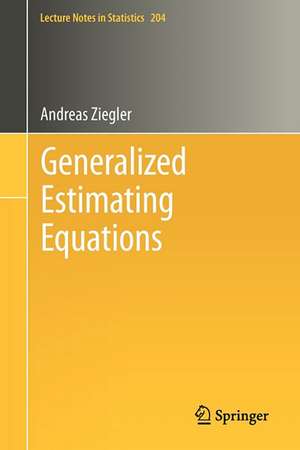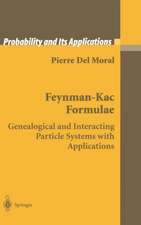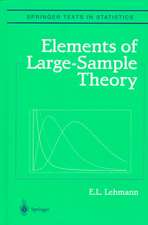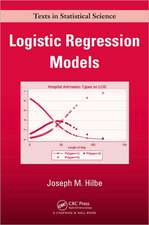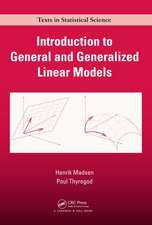Generalized Estimating Equations: Lecture Notes in Statistics, cartea 204
Autor Andreas Ziegleren Limba Engleză Paperback – 21 iun 2011
Therefore, the main goal of this book is to give a systematic presentation of the original generalized estimating equations (GEE) and some of its further developments. Subsequently, the emphasis is put on the unification of various GEE approaches. This is done by the use of two different estimation techniques, the pseudo maximum likelihood (PML) method and the generalized method of moments (GMM).
The author details the statistical foundation of the GEE approach using more general estimation techniques. The book could therefore be used as basis for a course to graduate students in statistics, biostatistics, or econometrics, and will be useful to practitioners in the same fields.
Din seria Lecture Notes in Statistics
- 15%
 Preț: 631.86 lei
Preț: 631.86 lei - 17%
 Preț: 490.19 lei
Preț: 490.19 lei - 17%
 Preț: 460.28 lei
Preț: 460.28 lei - 18%
 Preț: 945.92 lei
Preț: 945.92 lei - 18%
 Preț: 1007.35 lei
Preț: 1007.35 lei - 18%
 Preț: 1231.47 lei
Preț: 1231.47 lei -
 Preț: 383.33 lei
Preț: 383.33 lei - 15%
 Preț: 640.71 lei
Preț: 640.71 lei - 15%
 Preț: 658.88 lei
Preț: 658.88 lei -
 Preț: 436.14 lei
Preț: 436.14 lei - 20%
 Preț: 561.42 lei
Preț: 561.42 lei - 15%
 Preț: 639.59 lei
Preț: 639.59 lei - 15%
 Preț: 633.53 lei
Preț: 633.53 lei - 18%
 Preț: 943.25 lei
Preț: 943.25 lei - 15%
 Preț: 641.38 lei
Preț: 641.38 lei - 18%
 Preț: 995.97 lei
Preț: 995.97 lei - 18%
 Preț: 943.25 lei
Preț: 943.25 lei - 15%
 Preț: 643.00 lei
Preț: 643.00 lei - 18%
 Preț: 947.18 lei
Preț: 947.18 lei - 18%
 Preț: 942.63 lei
Preț: 942.63 lei - 18%
 Preț: 886.62 lei
Preț: 886.62 lei -
 Preț: 383.12 lei
Preț: 383.12 lei - 15%
 Preț: 633.35 lei
Preț: 633.35 lei - 15%
 Preț: 635.65 lei
Preț: 635.65 lei -
 Preț: 393.74 lei
Preț: 393.74 lei - 15%
 Preț: 632.70 lei
Preț: 632.70 lei - 15%
 Preț: 637.28 lei
Preț: 637.28 lei - 15%
 Preț: 702.87 lei
Preț: 702.87 lei - 15%
 Preț: 642.68 lei
Preț: 642.68 lei - 15%
 Preț: 644.63 lei
Preț: 644.63 lei - 15%
 Preț: 645.14 lei
Preț: 645.14 lei -
 Preț: 382.36 lei
Preț: 382.36 lei - 15%
 Preț: 636.30 lei
Preț: 636.30 lei - 15%
 Preț: 647.92 lei
Preț: 647.92 lei -
 Preț: 380.63 lei
Preț: 380.63 lei - 18%
 Preț: 887.05 lei
Preț: 887.05 lei - 15%
 Preț: 634.32 lei
Preț: 634.32 lei - 15%
 Preț: 648.74 lei
Preț: 648.74 lei -
 Preț: 378.92 lei
Preț: 378.92 lei - 15%
 Preț: 648.56 lei
Preț: 648.56 lei - 15%
 Preț: 647.59 lei
Preț: 647.59 lei - 18%
 Preț: 780.37 lei
Preț: 780.37 lei - 15%
 Preț: 641.20 lei
Preț: 641.20 lei - 18%
 Preț: 1102.69 lei
Preț: 1102.69 lei - 15%
 Preț: 643.16 lei
Preț: 643.16 lei -
 Preț: 384.70 lei
Preț: 384.70 lei - 15%
 Preț: 640.37 lei
Preț: 640.37 lei
Preț: 937.89 lei
Preț vechi: 1143.77 lei
-18% Nou
Puncte Express: 1407
Preț estimativ în valută:
179.50€ • 186.68$ • 150.21£
179.50€ • 186.68$ • 150.21£
Carte tipărită la comandă
Livrare economică 15-29 martie
Preluare comenzi: 021 569.72.76
Specificații
ISBN-13: 9781461404989
ISBN-10: 1461404983
Pagini: 162
Ilustrații: XV, 144 p.
Dimensiuni: 155 x 235 x 13 mm
Greutate: 0.23 kg
Ediția:2011
Editura: Springer
Colecția Springer
Seria Lecture Notes in Statistics
Locul publicării:New York, NY, United States
ISBN-10: 1461404983
Pagini: 162
Ilustrații: XV, 144 p.
Dimensiuni: 155 x 235 x 13 mm
Greutate: 0.23 kg
Ediția:2011
Editura: Springer
Colecția Springer
Seria Lecture Notes in Statistics
Locul publicării:New York, NY, United States
Public țintă
ResearchCuprins
The linear exponential family.- The quadratic exponential family.- Generalized linear models.- Maximum likelihood method.- Quasi maximum likelihood method.- Pseudo maximum likelihood method based on the linear exponential family.- Quasi generalized pseudo maximum likelihood method based on the linear exponential family.- Algorithms for solving the generalized estimating equations and the relation to the jack-knife estimator of variance.- Pseudo maximum likelihood estimation based on the quadratic exponential family.- Generalized method of moment estimation.
Notă biografică
After studying statistics and mathematics at the University of Munich, Andreas Ziegler obtained his doctoral degree from the University of Dortmund (Germany) for his thesis on methodological developments on generalized estimating equations. In the past 15 years, he has authored or co-authored more than 300 journal articles and 6 books. He has received several awards for his methodological developments and collaborative studies in clinical trials and genetic epidemiology. Andreas Ziegler is professor and head of the Institute of Medical Biometry and Statistics at the University of Lübeck (Germany).
Textul de pe ultima copertă
Generalized estimating equations have become increasingly popular in biometrical, econometrical, and psychometrical applications because they overcome the classical assumptions of statistics, i.e. independence and normality, which are too restrictive for many problems.
Therefore, the main goal of this book is to give a systematic presentation of the original generalized estimating equations (GEE) and some of its further developments. Subsequently, the emphasis is put on the unification of various GEE approaches. This is done by the use of two different estimation techniques, the pseudo maximum likelihood (PML) method and the generalized method of moments (GMM).
The author details the statistical foundation of the GEE approach using more general estimation techniques. The book could therefore be used as basis for a course to graduate students in statistics, biostatistics, or econometrics, and will be useful to practitioners in the same fields.
Therefore, the main goal of this book is to give a systematic presentation of the original generalized estimating equations (GEE) and some of its further developments. Subsequently, the emphasis is put on the unification of various GEE approaches. This is done by the use of two different estimation techniques, the pseudo maximum likelihood (PML) method and the generalized method of moments (GMM).
The author details the statistical foundation of the GEE approach using more general estimation techniques. The book could therefore be used as basis for a course to graduate students in statistics, biostatistics, or econometrics, and will be useful to practitioners in the same fields.
Caracteristici
Generalized estimating equations have become increasingly popular in biometrical, econometrical, and psychometrical applications In this book, they are derived in a unified way using pseudo maximum likelihood estimation and the generalized method of moments References to the relevant literature discussing technical details are provided for the interested reader Includes supplementary material: sn.pub/extras
